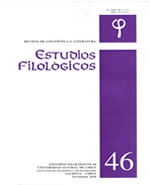Temporality, strategic asset in official documents of Human Rights in Chile
Main Article Content
Abstract
This article focuses on the analysis of the reconstruction of historical memories in official reports of human rights violations in Chile (Rettig Report and Valech Report). We postulate that this reconstruction is realized, in part, through the valorative symbolic representation of the time framework in the discourse. In this way, the temporal phases are constituted from determinate valuations of Social Esteem and Social Sanction jugement, Appreciation and Afect with different levels of engagement (Appraisal Theory). We consider that this valorative symbolic representation of the time framework has the potential to legitimate perspectives of historical memories, and due to its fundamental role in the discourse of history, it is necessary to reevaluate the location of this dimention in the systemic network of appraisal.

